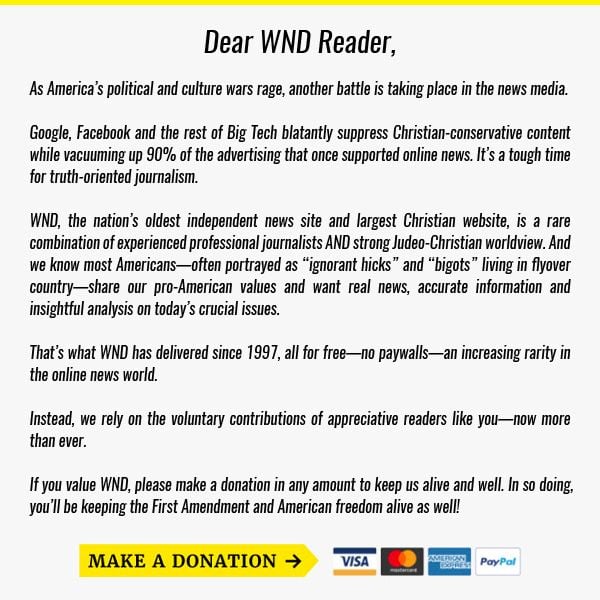
[Editor's note: This story originally was published by Real Clear Politics.]
By Kalev Leetaru
Real Clear Politics
On Tuesday, Twitter demonstrated the breadth of the censorship powers now wielded by social media platforms. In the space of a single day, the company both apologized for a series of tweets by the president of the United States and formally labeled two more of his tweets as false. What does Twitter’s newfound willingness to edit the president tell us about the future of free speech?
This week’s remarkable show of Silicon Valley’s power began with an official apology by Twitter for Donald Trump’s use of its platform to question the circumstances surrounding the long-ago death of a staffer in then-Rep. Joe Scarborough’s congressional office. In response to requests by family members of Lori Klausutis to remove Trump’s tweets, the company said they would remain, but issued an apology: “We are deeply sorry about the pain these statements, and the attention they are drawing, are causing the family.”
(Klausutis was an intern in the Fort Walton Beach, Fla., office of Scarborough, who is now the host of MSNBC’s “Morning Joe” and a vociferous critic of the president. Klausutis was found dead in the office on July 19, 2001. An autopsy concluded her death was accidental, the result of a fall caused by an undiagnosed heart issue. Trump's tweet referred to the police investigation of the death as a "cold case" and implied potential wrongdoing by Scarborough.)
Asked why the company decided to issue the apology, why it has not done so for the myriad other harmful tweets posted on its platform each day, and whether it might issue further apologies in the future for presidential tweets, the company said it would not comment.
Twitter’s new response in publicly and directly criticizing its most prominent user suggests it may finally rein in the “Twitter president.” Hours after the apology, Twitter took the further step of formally labeling two other presidential tweets as “fals[e] claim[s]” and applied large visible warnings to both, saying, “Get the facts about mail-in ballots” and linking to a Twitter fact-check page.
On its official fact check, Twitter states that Trump’s “claims are unsubstantiated, according to CNN, Washington Post and others.” It goes on to say he “falsely claimed that mail-in ballots would lead to ‘a Rigged Election.’ However, fact-checkers say there is no evidence” to support such a claim.
Yet, despite citing “fact-checkers” as having reviewed Trump’s assertions, Twitter does not actually link to any major fact-checking sites. Instead, it cites three sources: a news article in The Hill (excerpting its finding that his statements were “unsubstantiated claims”), an “analysis” column in The Washington Post (which defines “analysis” pieces as “interpretation of the news based on evidence, including data”) and Chris Cillizza’s “analysis” column for CNN.
Twitter’s “fact check” also asserts flatly that “[e]xperts point out that mail-in voting is very rarely linked to fraud” and cites as its election experts CBS News’ political reporter Grace Segers and Fortune magazine’s deputy digital editor Rachel Schallom. Twitter goes on to list others who have adjudged Trump’s tweets as false, including Vox’s Aaron Rupar, HuffPost’s Jennifer Bendery, the ACLU of Nebraska, CNN’s Abby Phillip, The Guardian’s Sam Levine, and CNN’s Daniel Dale. Alone among that group, Dale is a fact-checker.
Thus, Twitter’s presidential fact check appears to be largely based on commentary from journalists. Just one expert cited occupies a formal fact-checking role and Twitter cites no major fact-checking organizations. Asked why it decided to fact-check these specific tweets, whether it planned to fact-check the rest of the president’s statements going forward, how it selected its experts and evidence and what burden of proof it used to determine that Trump’s claims were false, the company also declined to comment beyond stating that his two tweets “contain potentially misleading information about voting processes and have been labeled to provide additional context around mail-in ballots. This decision is in line with the approach we shared earlier this month.”
By not further explaining itself, Twitter’s newfound activism raises questions in the midst of an election year. Its position appears to be that it now has the right to decide whether U.S. government statements are "true" or "false." That’s a lot of power Silicon Valley has allotted to itself.
RealClear Media Fellow Kalev Leetaru is a senior fellow at the George Washington University Center for Cyber & Homeland Security. His past roles include fellow in residence at Georgetown University’s Edmund A. Walsh School of Foreign Service and member of the World Economic Forum’s Global Agenda Council on the Future of Government.
[Editor's note: This story originally was published by Real Clear Politics.]
The post Twitter raises questions by adding comment to Trump Tweets appeared first on WND.
via IFTTT
InoreaderURL: SECONDARY LINK

